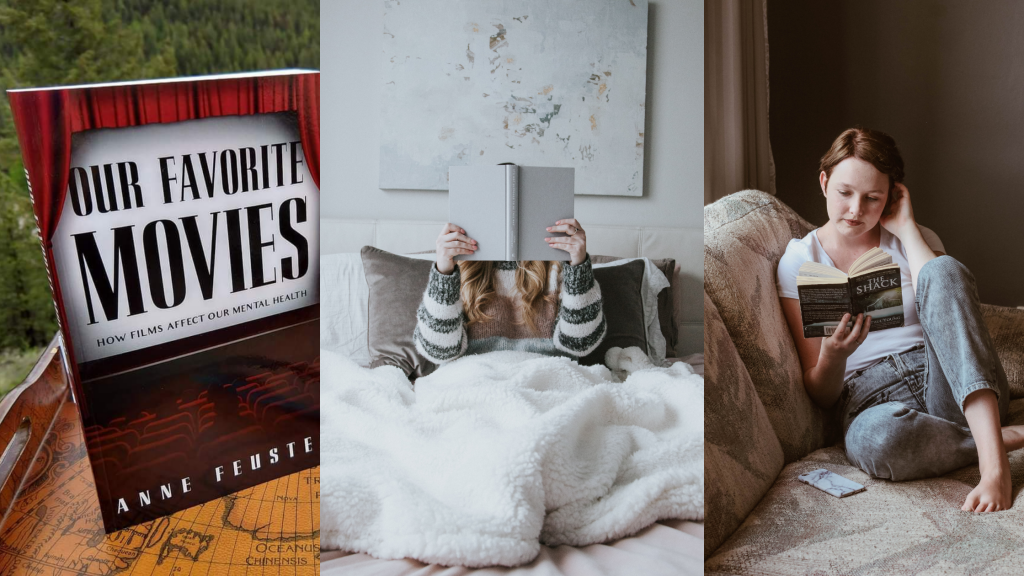
Bibliotherapy and Cinematherapy
Reading is Beneficial to Our Health
As a book lover I always knew that reading books made me happy. I could immerse myself in a book and forget my problems for a while, be transported to another place where I could escape. Little did I know that reading books, and watching movies, can help improve mental health for people who struggle with anxiety, depression, and other mental illnesses. These mediums can help us cope with life events such as grieving a lost loved one.
Recently I was introduced to an author, Anne Feustel, who wrote a book on cinematherapy. I’d never heard the term before and was intrigued. About the same time I saw a video on Instagram where a bookstagrammer was talking about comfort books. It pinged the idea in my head that certain books, and movies, TV series, even songs or poems, can serve as havens in time of uncertainty and that I used all of these types of productions as impromptu therapy from time to time. When I’m feeling down, I blast a happy song, read my favorite love story, or watch my favorite movie or series.
Bibliotherapy
Bibliotherapy uses reading (and cinematherapy uses movie watching) as a way to help facilitate the healing process and achieve therapeutic goals and is a common strategy in many types of treatment. The therapist looks at bibliotherapy as a therapeutic approach and uses it as part of the healing or treatment process. It can be employed in an individual as well as group format. Either way, certain books (or movies) are assigned and discussed in talk therapy sessions either with the group or with the therapist.
Bibliotherapy helps examine in a safe way patterns and insight into challenges one may be dealing with. It can help think a person of strategies to deal with problems by seeing how others may deal. It can aid in problem solving, understanding feelings, and self-awareness. It may even be a way to explore feelings and release grieve and sadness in a way that is manageable.
When you identify with characters in a book, movie, or show that are dealing with similar issues, especially on an emotional level, you may relate and not feel so alone. You may be able to gain hope and get ideas on how you may navigate similar situations and cope with personal challenges. You may recognize something about yourself that you didn’t realize before by feeling connected to characters.
Cinematherapy
In her book, Our Favorite Movies – How Films Affect Our Mental Health, Anne describes her struggle with depression and psychosis and how specific movies aided her mental health journey. She curates a list of movies and describes specifically why each is helpful to her. She also talks about cinematherapy and different types of therapy and experts in the field.
Bibliotherapy and cinematherapy are used to treat anxiety, depression, substance abuse, eating disorders, relationship issues feelings of isolation, meaninglessness, help overcome shyness, grief, and rejection, as well as other mental health challenges.
Reading the book I began to think about books, movies, and TV series that I return to time and time again. In high school I read Gone with the Wind over and over. A few years back I became obsessed with Stephenie Meyer’s Twilight series and still re-watch the movies when I’m feeling blue. Just last year, I saw The Vampire Diaries series in full at least six times (no judgment). I think these books and series are my comfort series. I relate to the characters, their hopes, their dreams, their struggles, and don’t feel so alone. I also use their triumphs to remember there is hope, inspire me to achieve my next goal.
I heard a podcast once that talked about adolescents reading fantasy books and how they could be detrimental to social emotional development. The podcaster cited this is a general concern for children and teens reading fantasy. And perhaps it is true to some extent. But even in fantasy, characters make friends, lose loved ones, deal with heartbreak, and are challenged to meet their next hurdle.
Have a favorite book or show you return to over and over again? Let us know in the comments!
If you’re struggling with depression or other mental health needs, please seek help. Resources can be found at the following.
National Institute of Mental Health
301-496-9576
www.nimh.nih.gov
For more on bibliotherapy go here.
Looking for an inspirational read or series? Check out Drops of Sunshine or my Being Me series.
Want more fantasy in your life? Browse my YA fantasy titles.
Looking for a feel good happily ever after? Dive into Perfect Always!
Happy reading (and listening and watching)! – Tricia
Photo credits: Middle image – Photo by David Lezcano on Unsplash, Right image – Photo by Sincerely Media on Unsplash